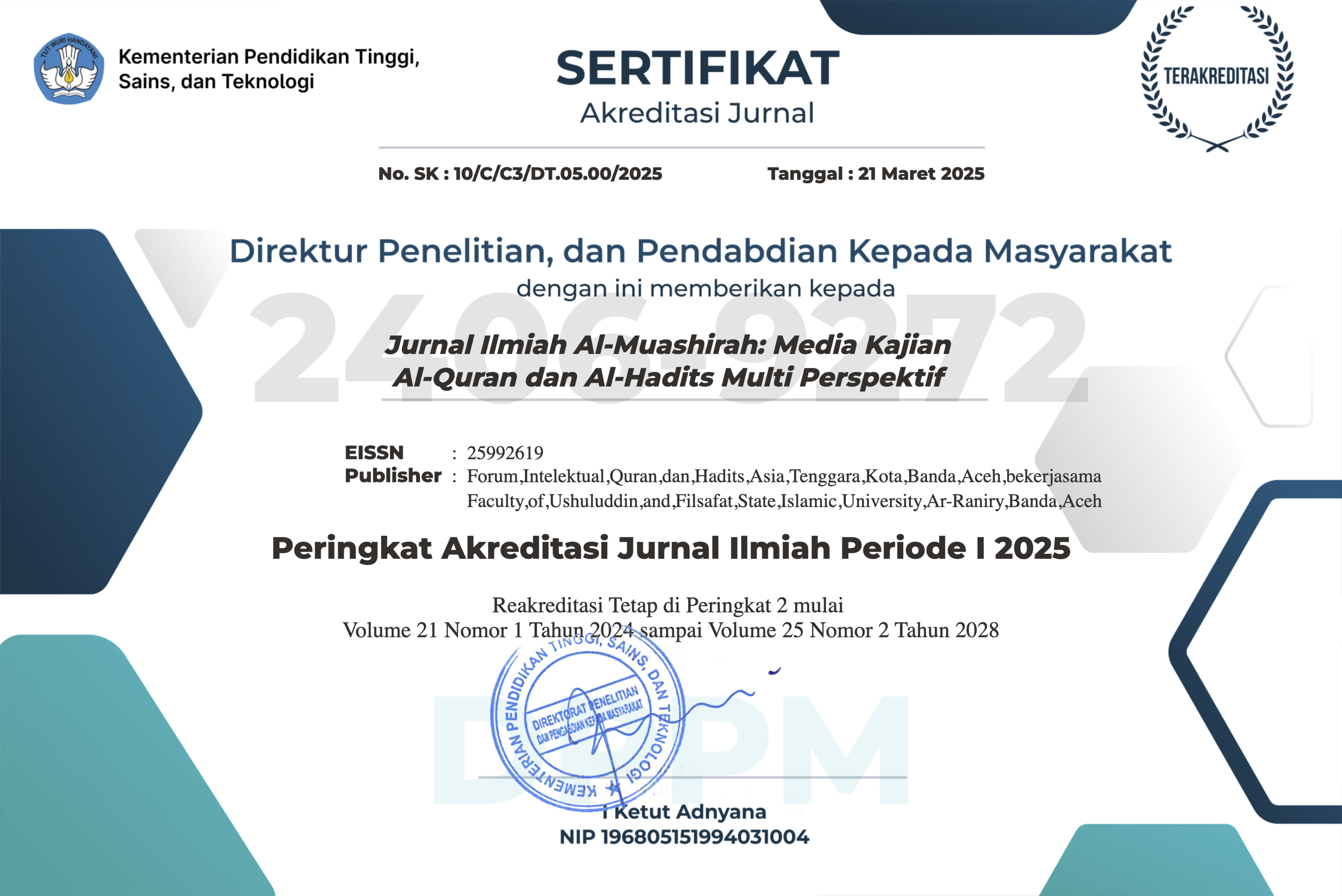The Living Application of Qur’anic Legal Norms in the Indonesian Legal System: A Systematic Review of Ayat al-Aḥkam
DOI:
https://doi.org/10.22373/jim.v22i1.30238Keywords:
ayat al-aḥkām, Islamic law, Qur’anic legislation, IndonesianAbstract
This article systematically examines how Qur’anic legal verses (ayat al-aḥkām) have been implemented in Indonesia’s formal legal system between 2010 and 2024. Using a Systematic Literature Review (SLR) approach guided by the PRISMA 2020 protocol, nine peer-reviewed journal articles were selected from seven academic databases. The findings indicate that the legislative reception of ayat al-aḥkām varies significantly across legal domains. Economic law shows the most structured integration, with verses on zakat, riba, and halal consumption codified through clear statutory instruments and supported by functional institutions. In contrast, criminal law provisions—such as hand-amputation and public lashing—face hermeneutic reinterpretation and procedural constraints, limiting their operational impact. Family law demonstrates interpretive adaptability, where issues like polygamy and inheritance are mediated through maqāṣid-oriented readings and legal safeguards. Rather than static injunctions, these verses exhibit a living character—negotiated, reinterpreted, and embodied within contemporary legal and institutional settings. Across domains, Qur’anic legal norms “live” through contextual engagement with doctrinal consensus, institutional readiness, and political feasibility. These findings reaffirm Indonesia’s dynamic and negotiated approach to Islamic legal integration, suggesting that future Qur’an-based legislation will depend as much on contextual alignment as on textual authority.
Downloads
References
Abdillah, Masykuri, ‘Islam and Democracy: The Case of the Early Reform Era’, JURNAL INDO-ISLAMIKA, 14.2 (2024), pp. 357–76, doi:10.15408/JII.V14I2.43764
Ahimsa-Putra, Heddy Shri, ‘The Living Al-Qur’an: Beberapa Perspektif Antropologi’, Walisongo: Jurnal Penelitian Sosial Keagamaan, 20.1 (2012), p. 235, doi:10.21580/ws.20.1.198
Ainun Najib, ‘Legislasi Hukum Islam Dalam Sistem Hukum Nasional’, Istidlal: Jurnal Ekonomi Dan Hukum Islam, 4.2 (2020), pp. 116–26, doi:10.35316/istidlal.v4i2.267
An-Na’im, A A, Islam and the Secular State: Negotiating the Future of Shari`a (Harvard University Press, 2010)
Arifianto, Alexander R., ‘Rising Islamism and the Struggle for Islamic Authority in Post- Reformasi Indonesia’, TRaNS: Trans -Regional and -National Studies of Southeast Asia, 8.1 (2020), pp. 37–50, doi:10.1017/trn.2019.10
Badruddin, Badruddin, and Aditya Prastian Supriyadi, ‘Dinamika Hukum Islam Indonesia : Reaktualisasi Norma Islam Dalam Menalarkan Hukum Positif Merespon Sosio-Kultural Era Kontemporer’, De Jure: Jurnal Hukum Dan Syar’iah, 14.1 (2022), pp. 38–57, doi:10.18860/j-fsh.v14i1.15512
Barlas, Asma, Believing Women" in Islam: Unreading Patriarchal Interpretations of the Qur’an (University of Texas Press, 2002)
Erlina, Lira, ‘Poligami Dalam Al-Quran Dan Konsep Maqashid Syari’ah Ibnu ‘Asyur’, ZAD Al-Mufassirin, 1.1 (2019), pp. 78–102, doi:10.55759/zam.v1i1.4
Hakim, Budi Rahmat, ‘ANALISIS TERHADAP UNDANG-UNDANG NOMOR 23 TAHUN 2011 TENTANG PENGELOLAAN ZAKAT (PERSPEKTIF HUKUM ISLAM)’, Syariah Jurnal Hukum Dan Pemikiran, 15.2 (2016), doi:10.18592/syariah.v15i2.552
Hakim, Lukmanul, and Aisyah Karnila Nady Putri, ‘Implementation of the Halal Product Guarantee Law in Indonesia by the Department of Industry and Trade Cooperatives of Bima City’, Nurani: Jurnal Kajian Syari’ah Dan Masyarakat, 22.1 (2022), pp. 133–44, doi:10.19109/nurani.v22i1.11099
Handayani, Rossi, ‘Berapa Jumlah Ayat-Ayat Hukum Dalam Alquran?’, Republika Online, 2021 <https://islamdigest.republika.co.id/berita/qp70yu320/berapa-jumlah-ayatayat-hukum-dalam-alquran?utm_source=chatgpt.com>
Hanum, Cholida, ‘Perda Syariah Perspektif Ketatanegaraan Dan Siyasah Dusturiyyah’, Al-Ahkam Jurnal Ilmu Syari’ah Dan Hukum, 4.2 (2019), doi:10.22515/alahkam.v4i2.1530
Harahap, Burhanudin, Tastaftiyan Risfandy, and Inas Nurfadia Futri, ‘Islamic Law, Islamic Finance, and Sustainable Development Goals: A Systematic Literature Review’, Sustainability, 15.8 (2023), p. 6626, doi:10.3390/su15086626
Hasyim, Muh. Fathoni, Tafsir Ayat-Ayat Ahkam-Pidana (Kanzum Books, 2020)
Huda, Miftahul, and Tri Wahyu Hidayati, ‘The Concept of Muḥammad Shaḥrūr on Gender Parity in Inheritance Legislation’, El-Usrah: Jurnal Hukum Keluarga, 6.2 (2023), p. 262, doi:10.22373/ujhk.v6i2.18121
Ince Aprianti, St. Hadijah Wahid, and Resky Wahyuni, ‘IMPLEMENTASI HUKUM ISLAM DALAM KEPUTUSAN PENGADILAN AGAMA DALAM KONTEKS SOSIAL BUDAYA’, Jurnal Al-Ahkam: Jurnal Hukum Pidana Islam, 6.1 (2024), pp. 69–81, doi:10.47435/al-ahkam.v6i1.2451
Kader, Haithem, ‘Human Well-Being, Morality and the Economy: An Islamic Perspective’, Islamic Economic Studies, 28.2 (2021), pp. 102–23, doi:10.1108/IES-07-2020-0026
Khodijah, Siti, ‘Hukum Potong Tangan Dan Pemberlakuannya Di Indonesia’ (UIN Syarif Hidayatullah, 2015) <https://repository.uinjkt.ac.id/dspace/handle/123456789/30251>
KonsultasiSyariah, ‘Ayat-Ayat Hukum Dalam Al-Quran - KonsultasiSyariah.In’, KonsultasiSyariah.In, 2016 <https://www.konsultasisyariah.in/2016/07/ayat-ayat-hukum-dalam-al-quran.html>
Larsen, L, Z Mir-Hosseini, C Moe, and K Vogt, Gender and Equality in Muslim Family Law: Justice and Ethics in the Islamic Legal Tradition (Bloomsbury Publishing, 2013)
Lavan, Yohana Oktaviani, ‘IMPLEMENTATION OF ISLAMIC VALUES IN INDONESIAN POLITICAL DYNAMICS’, Intelegensia : Jurnal Pendidikan Islam, 9.1 (2021), pp. 53–66, doi:10.34001/intelegensia.v9i1.2042
Mansyuroh, Firqah Annajiyah, ‘Hukum Potong Tangan Bagi Koruptor (Kajian Ahkam Surah Al-Maidah Ayat 38)’, Dialogia, 17.1 (2019), pp. 41–60, doi:10.21154/dialogia.v17i1.1407
Mappasessu, Mappasessu, Rekonstruksi Metodologi Instinbat Hukum Terhadap Hukum Kewarisan Di Indonesia (PT. Mafy Media Literasi Indonesia, 2025)
Mikail, Kiki, and Jeniwaty Moh Jody, ‘Evolving Dynamics of Civil Islam in Post-Reformation Indonesia: Balancing Democratic Aspirations and State Authority’, MUHARRIK: Jurnal Dakwah Dan Sosial, 7.1 (2024), pp. 123–31, doi:10.37680/muharrik.v7i1.6132
Mir-Hosseini, Ziba, Mulki Al-Sharmani, Jana Rumminger, and Sarah Marsso, Justice and Beauty in Muslim Marriage: Towards Egalitarian Ethics and Laws, 2022
Muhibbuthabary, Taslim HM Yasin, Saifuddin A. Rasyid, Rahmad Syah Putra, Nurrauzhah Fitria, and Rahmat Kurniawan, ‘The Implementation of The Caning Law in Aceh Following The Enactment of The Aceh Qanun Number 6 Of 2014 Concerning The Jinayat Law: Is It More Effective?’, PETITA: JURNAL KAJIAN ILMU HUKUM DAN SYARIAH, 8.2 (2023), doi:10.22373/petita.v8i2.210
Page, Matthew J, Joanne E McKenzie, Patrick M Bossuyt, Isabelle Boutron, Tammy C Hoffmann, Cynthia D Mulrow, and others, ‘The PRISMA 2020 Statement: An Updated Guideline for Reporting Systematic Reviews’, BMJ, 2021, p. n71, doi:10.1136/bmj.n71
Pati, Debajyoti, and Lesa N. Lorusso, ‘How to Write a Systematic Review of the Literature’, HERD: Health Environments Research & Design Journal, 11.1 (2018), pp. 15–30, doi:10.1177/1937586717747384
Petticrew, Mark, and Helen Roberts, Systematic Reviews in the Social Sciences: A Practical Guide (Blackwell Publishing, 2006)
Prasastia A, Muhammad Esa, ‘Living Quran Study (a New Approach in the Development of Quranic Tafsir)’, Eduvest - Journal Of Universal Studies, 1.1 (2021), doi:10.36418/edv.v1i1.255
Rukoyah, Andriani Fitri, and Diyan Putri Ayu, ‘Implementasi UU Nomor 33 Tahun 2014 Tentang Jaminan Produk Halal Pada Produk Makanan Industri Kecil Menengah Di Desa Ploso Kabupaten Pacitan’, Journal of Sharia Economic Law, 1.1 (2023), pp. 43–52, doi:10.37680/jshel.v1i1.2324
Shafra, Shafra, Mauliddin Mauliddin, Nur Azizah Azizah, Elfiani Elfiani, and Elkhairati Elkhairati, ‘Restricting Unregistered Polygamy: Protecting Women’s Rights within the Framework of Maqasid Shariah’, in ICSIS Proceedings (Doctoral Programme in Sharia Science in Islamic Law at State Islamic University Sjech M. Djamil Djambek Bukittinggi, 2024) <https://icsisproceedings.org/index.php/icsis/article/view/10>
Siregar, Hasnil Basri, ‘ Islamic Law in a National Legal System: A Study on the Implementation of Shari’ah in Aceh, Indonesia ’, Asian Journal of Comparative Law, 3 (2008), doi:10.1017/s2194607800000156
Susetyo, Heru, Farida Prihatini, Iffah Karimah, and Ahmad Ghozi, ‘Regulating Halal Products in Indonesia: Between Religious Needs and Socio-Economic Challenges’, Mazahib, 2019, pp. 1–43, doi:10.21093/mj.v18i1.1372
Syafril, ‘Tafsir Ahkam Dan Sejarah Perkembangannya’, Syahadah, 10.1 (2022), pp. 1–33 <https://ejournal.fiaiunisi.ac.id/index.php/syahadah/article/view/551>
Utriza, Ayang, ‘The Implementation of Sharia in Aceh as Based on the Code Extant in the Sultanate of Aceh from 1516-1688’, Studia Islamika: Indonesian Journal for Islamic Studies, 14.3 (2007)
Yusuf, Muhammad Yasir, ‘Dinamika Fatwa Bunga Bank Di Indonesia: Kajian Terhadap Fatwa MUI, Muhammaddiyah Dan Nahdhatul Ulama’, Media Syari’ah : Wahana Kajian Hukum Islam Dan Pranata Sosial, 14.2 (2012), p. 151, doi:10.22373/jms.v14i2.1872
Downloads
Published
Issue
Section
License
Copyright (c) 2025 Muhammad Yasir

This work is licensed under a Creative Commons Attribution-ShareAlike 4.0 International License.
Authors who publish in Jurnal Ilmiah Al-Mu'ashirah agree to the following terms:
- Authors retain copyright and grant the journal right of first publication with the work simultaneously licensed under a Attribution-ShareAlike 4.0 International (CC BY-SA 4.0) License that allows others to share the work with an acknowledgment of the work's authorship and initial publication in this journal.
- Authors are able to enter into separate, additional contractual arrangements for the non-exclusive distribution of the journal's published version of the work (e.g., post it to an institutional repository or publish it in a book), with an acknowledgment of its initial publication in this journal.
- Authors are permitted and encouraged to post their work online (e.g., in institutional repositories or on their website) prior to and during the submission process, as it can lead to productive exchanges, as well as earlier and greater citation of published work (See The Effect of Open Access).














